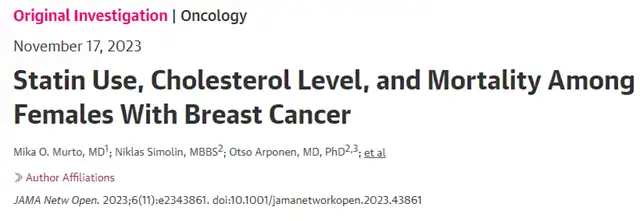Can Cholesterol-Lowering Drugs Impact Cancer Progression?
- Normal Liver Cells Found to Promote Cancer Metastasis to the Liver
- Nearly 80% Complete Remission: Breakthrough in ADC Anti-Tumor Treatment
- Vaccination Against Common Diseases May Prevent Dementia!
- New Alzheimer’s Disease (AD) Diagnosis and Staging Criteria
- Breakthrough in Alzheimer’s Disease: New Nasal Spray Halts Cognitive Decline by Targeting Toxic Protein
- Can the Tap Water at the Paris Olympics be Drunk Directly?
Can Cholesterol-Lowering Drugs Impact Cancer Progression?
- Should China be held legally responsible for the US’s $18 trillion COVID losses?
- CT Radiation Exposure Linked to Blood Cancer in Children and Adolescents
- FDA has mandated a top-level black box warning for all marketed CAR-T therapies
- Can people with high blood pressure eat peanuts?
- What is the difference between dopamine and dobutamine?
- How long can the patient live after heart stent surgery?
Can Cholesterol-Lowering Drugs Impact Cancer Progression?
Breast cancer, one of the most prevalent cancers affecting women globally and a leading cause of female cancer-related deaths, may be influenced by cholesterol-lowering medications, according to a recent study published in JAMA Network Open.
Estimates suggest that over 2 million people are diagnosed with breast cancer each year, with more than 680,000 succumbing to the disease.
Previous research indicated potential benefits of statin drugs for the survival of breast cancer patients.
However, the independent association between statin drugs, cholesterol levels, and breast cancer outcomes lacked reliable evidence until now.
The groundbreaking cohort study, recently published in JAMA Network Open, suggests that statin drugs might potentially reduce the risk of breast cancer-related death by lowering cholesterol levels. Serum cholesterol levels appear to be a crucial factor in the risk of breast cancer mortality.
Notably, after adjusting for cholesterol levels, the analysis revealed a correlation between the use of statin drugs post-breast cancer diagnosis and a decrease in the risk of breast cancer-related death.
Moreover, as the intensity of statin drug use increased, the risk of breast cancer-related death further declined, indicating that statin drugs might impact breast cancer outcomes through mechanisms beyond cholesterol reduction.

Hydroxymethylglutaryl-coenzyme A (HMG-CoA) reductase is a key enzyme in the synthesis of cholesterol in liver cells, and statin drugs, also known as HMG-CoA reductase inhibitors, are widely used for primary and secondary prevention of cardiovascular diseases.
The study suggests that statin drugs may indirectly influence breast cancer progression by reducing serum lipoprotein levels, which are precursors necessary for estrogen biosynthesis. Additionally, statin drugs may directly impact breast cancer progression by altering intracellular signaling pathways.
The research, based on a national cohort of Finnish patients diagnosed with invasive breast cancer between January 1, 1995, and December 31, 2013, included 13,378 patients with a median age of 62. The median follow-up time after breast cancer diagnosis was 4.5 years, during which 16.4% of patients died (7.0% due to breast cancer).
In addition to assessing serum cholesterol levels, statin drug use, and breast cancer mortality rates, the study collected data on lipid levels (total cholesterol, high-density lipoprotein [HDL], low-density lipoprotein [LDL], triglycerides) and hormone receptor status.
Multivariate adjusted analysis results showed that the use of statin drugs before breast cancer diagnosis was associated with an increased risk of breast cancer-related death compared to patients who did not use statin drugs (HR=1.41; 95% CI 1.18–1.68; P<0.001). Even after adjusting for total cholesterol levels, the analysis still indicated that pre-diagnosis statin drug use was a risk factor for breast cancer death (HR=1.22; 95% CI 1.02–1.46; P=0.03).
Conversely, post-diagnosis statin drug use was significantly associated with a reduced risk of breast cancer death after adjusting for lipid parameters (HR=0.85; 95% CI 0.73–1.00; P=0.05). Moreover, as the intensity of statin drug treatment increased, the reduction in the risk of breast cancer-related death was more pronounced.
It’s worth noting that among the patients who started taking statin drugs after breast cancer diagnosis, 781 experienced a subsequent decrease in cholesterol levels, while 199 had cholesterol levels similar to or higher than before treatment.
Stratified analysis based on changes in cholesterol levels after statin drug treatment showed a significant reduction in the risk of breast cancer death among patients with decreased total cholesterol levels (HR=0.49; 95% CI 0.32–0.75; P=0.001). In contrast, in patients with unchanged or increased cholesterol levels after treatment, the reduction in the risk of breast cancer death was not significant (HR=0.69; 95% CI 0.34–1.40; P=0.30).
Additionally, in estrogen receptor (ER)-positive breast cancer patients, statin drug use was significantly associated with a reduced risk of breast cancer death (HR=0.82; 95% CI 0.68–0.99; P=0.03). After adjusting for serum cholesterol levels, the analysis showed a significant 20% reduction in the risk of breast cancer death among patients receiving statin drug treatment compared to those not receiving treatment (HR=0.80; 95% CI 0.72–0.88; P<0.001).
In summary, the findings of this cohort study suggest that post-diagnosis statin drug treatment is associated with a reduced risk of breast cancer-related death, with the magnitude of risk reduction linked to changes in serum cholesterol levels after statin drug treatment. This discovery implies that using statin drugs for cholesterol reduction may be beneficial for breast cancer patients.
Can Cholesterol-Lowering Drugs Impact Cancer Progression?
Reference:
[1] Mika O. Murto et al., Statin Use, Cholesterol Level, and Mortality Among Females With Breast Cancer. JAMA Network Open (2023). DOI: 10.1001/jamanetworkopen.2023.43861
(source:internet, reference only)
Disclaimer of medicaltrend.org
Important Note: The information provided is for informational purposes only and should not be considered as medical advice.



